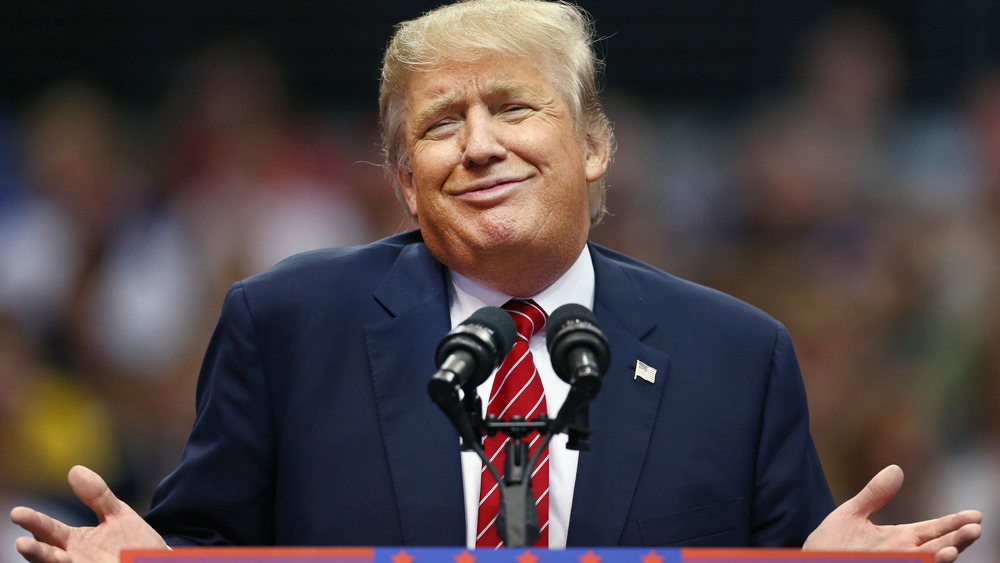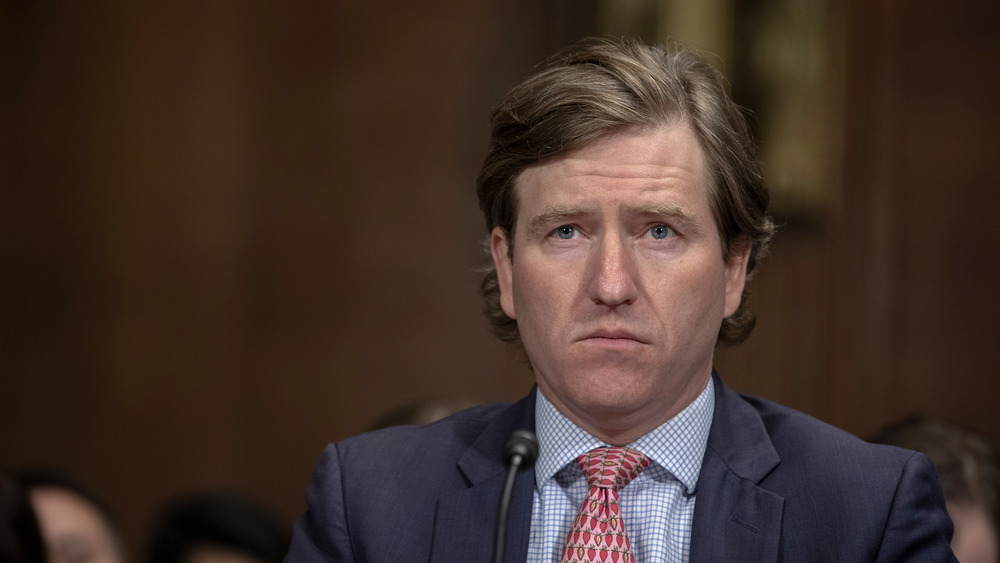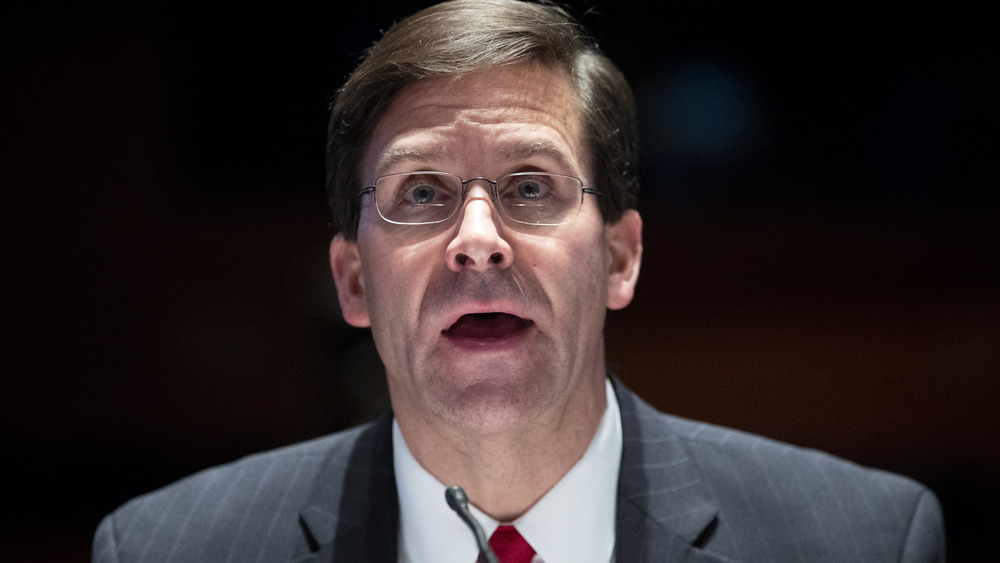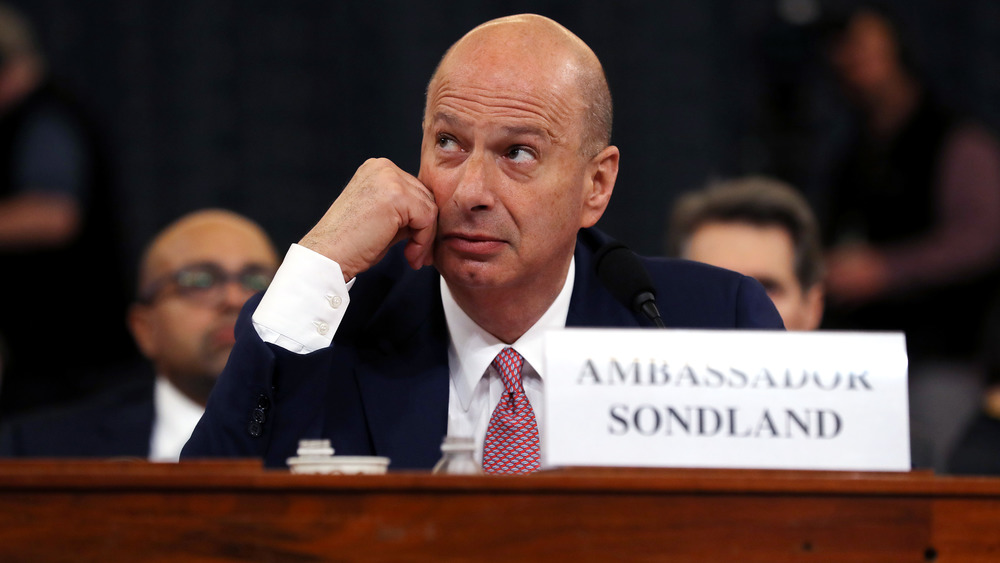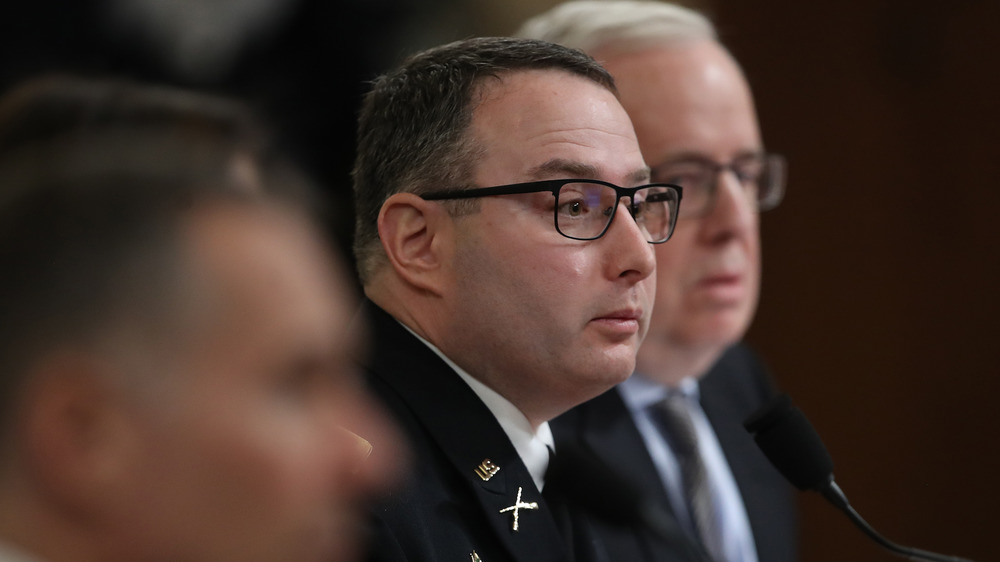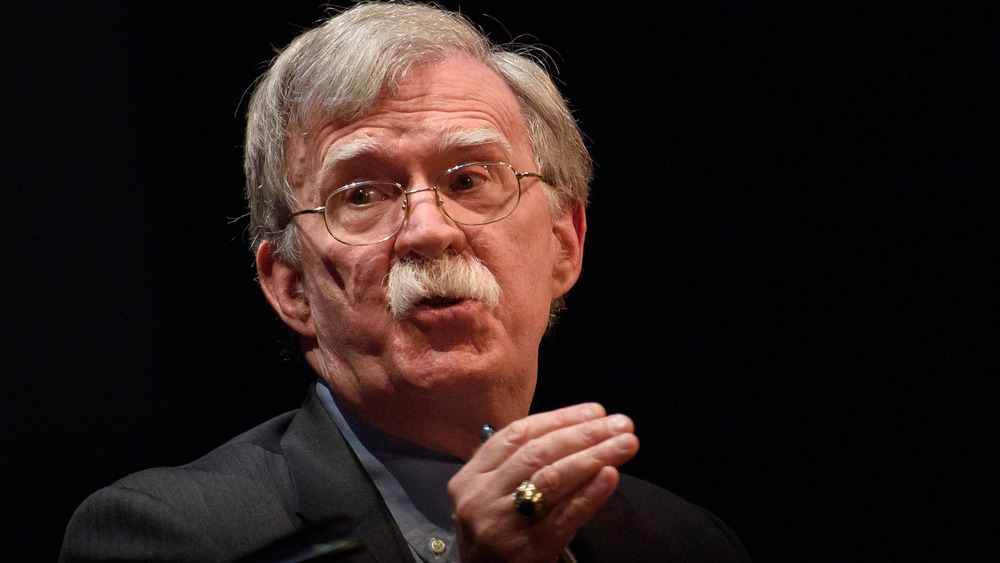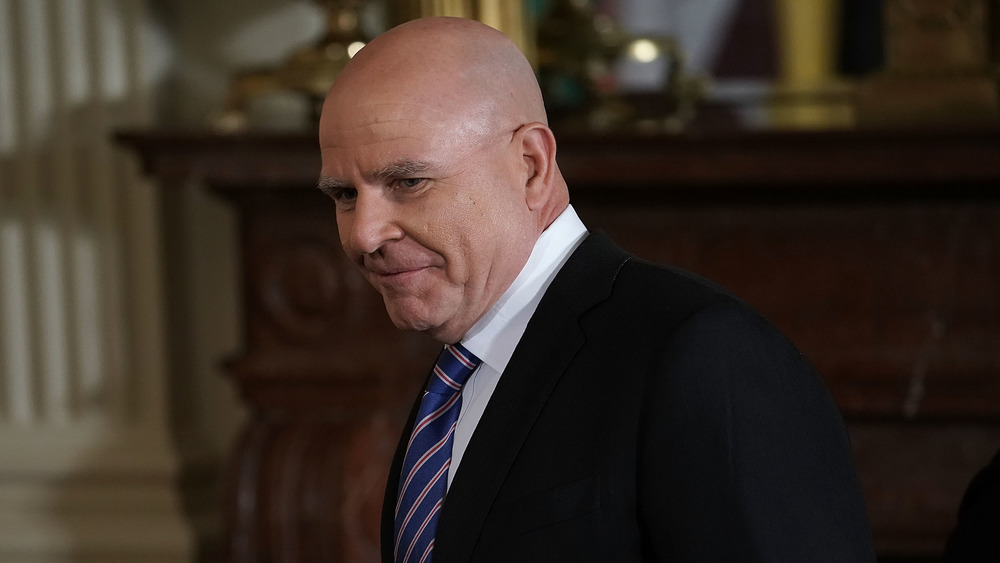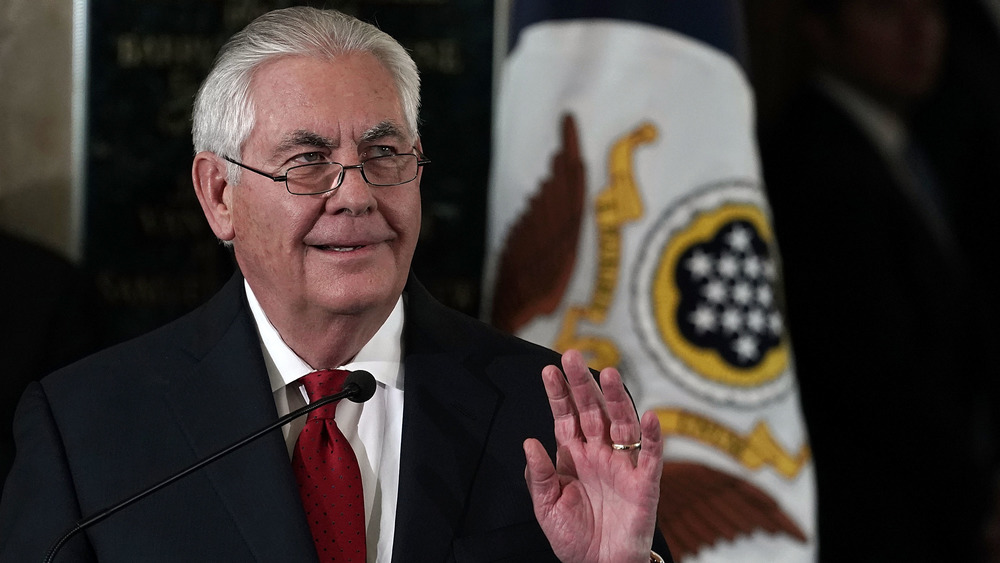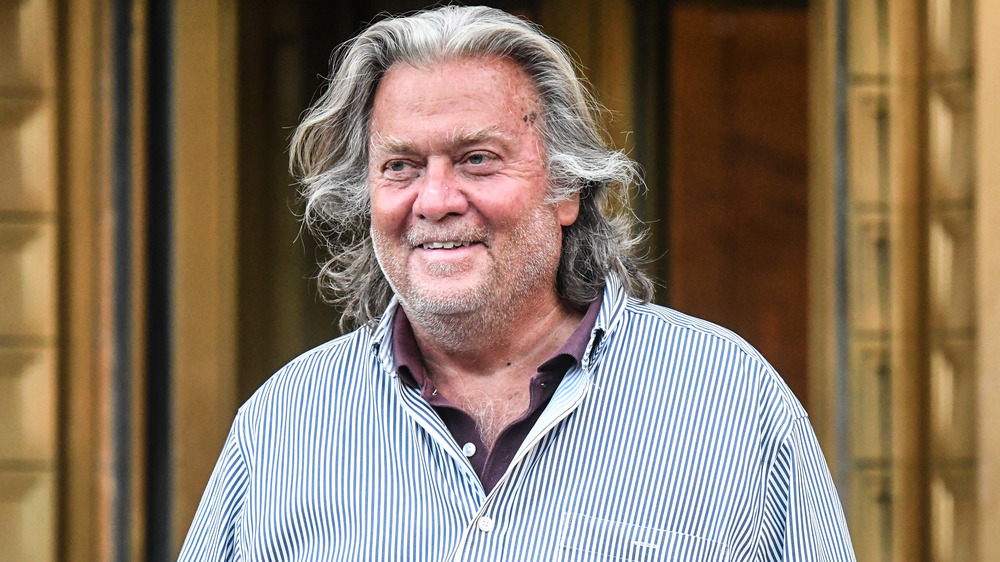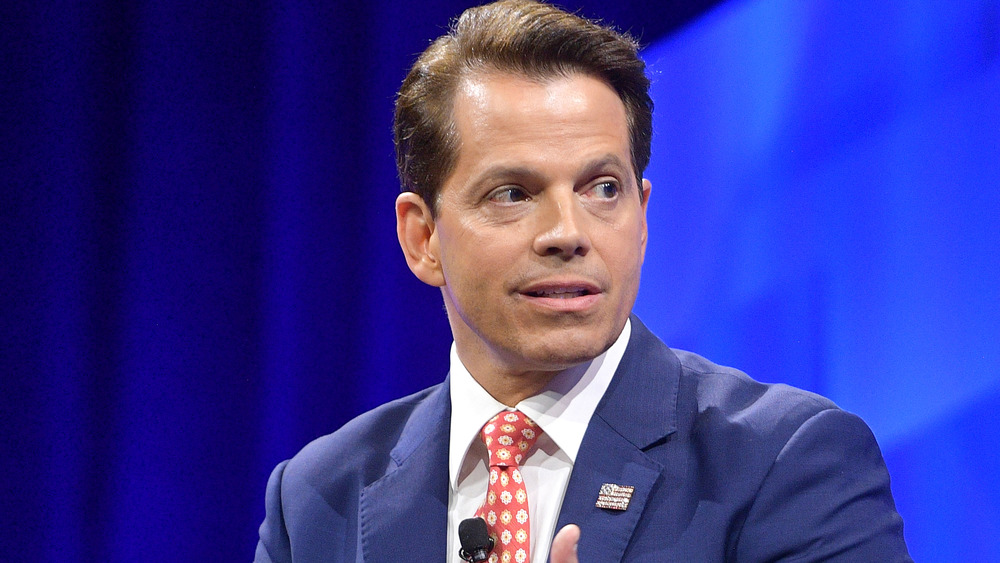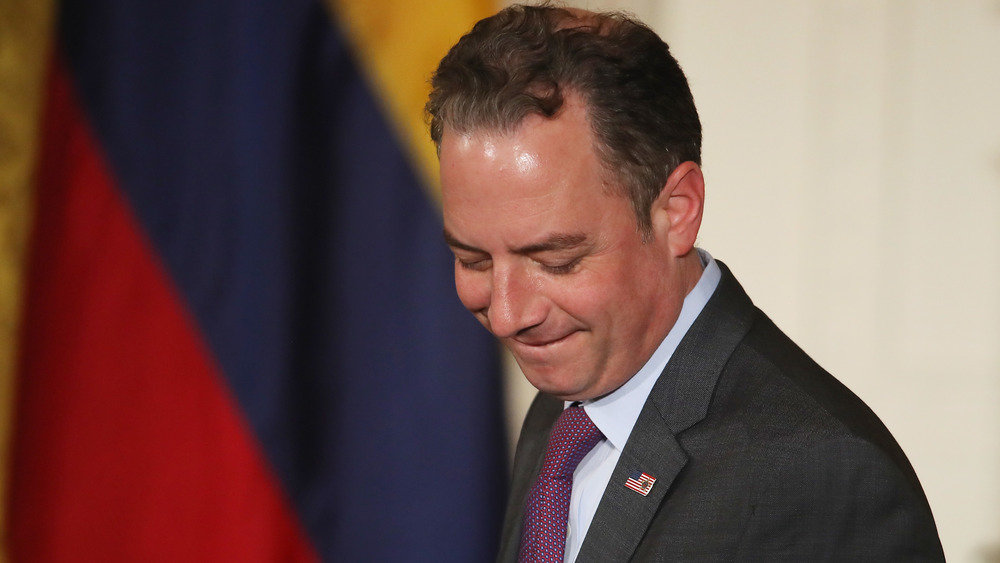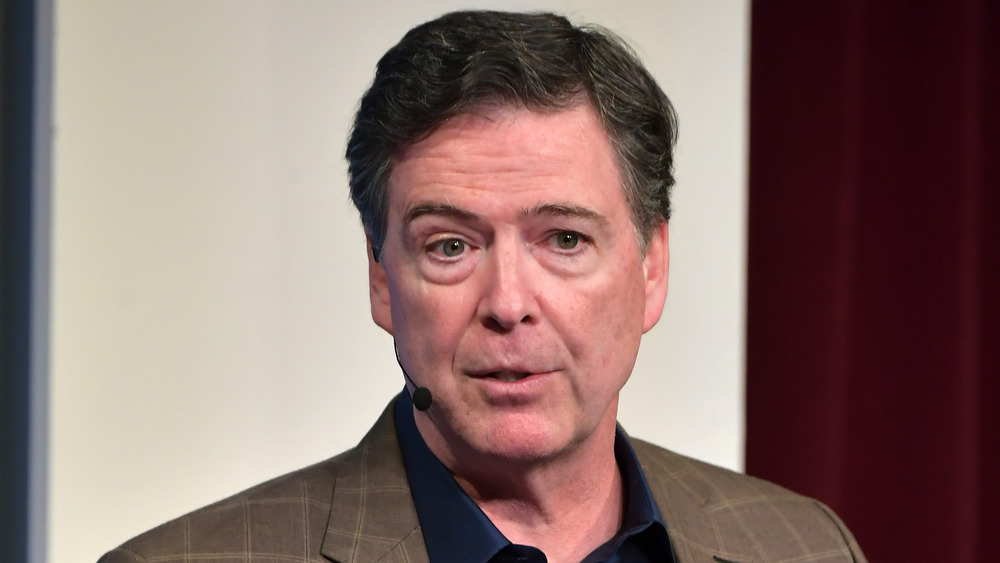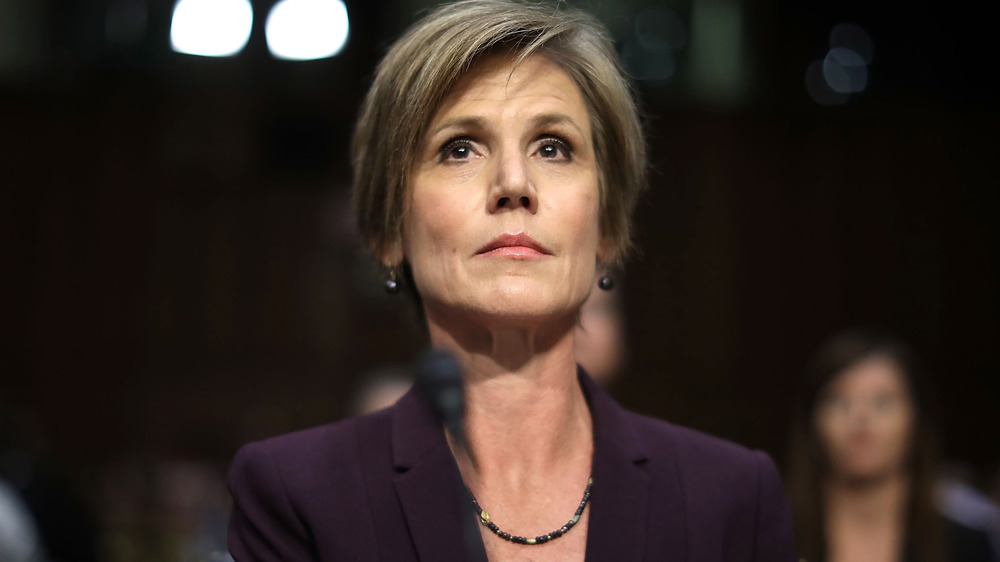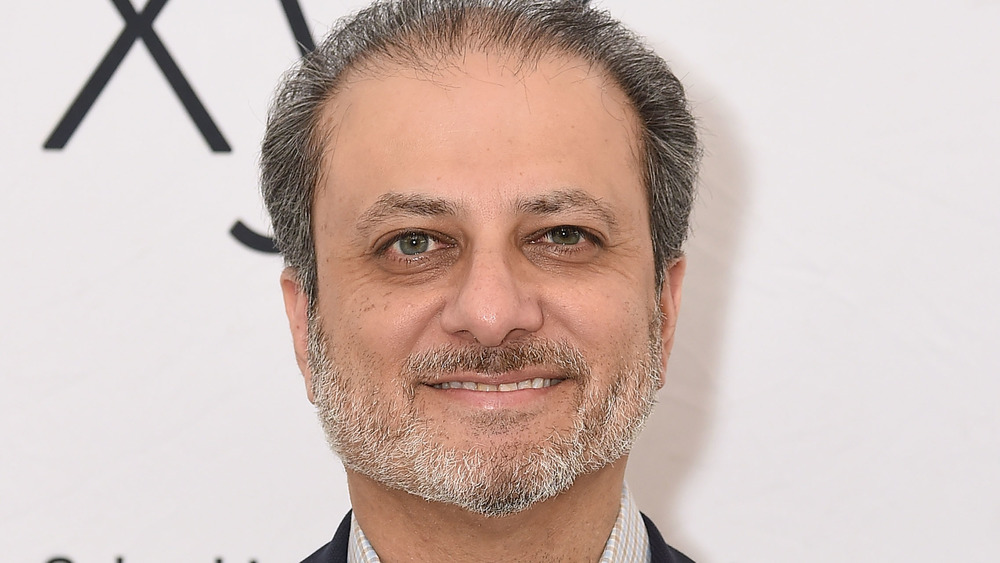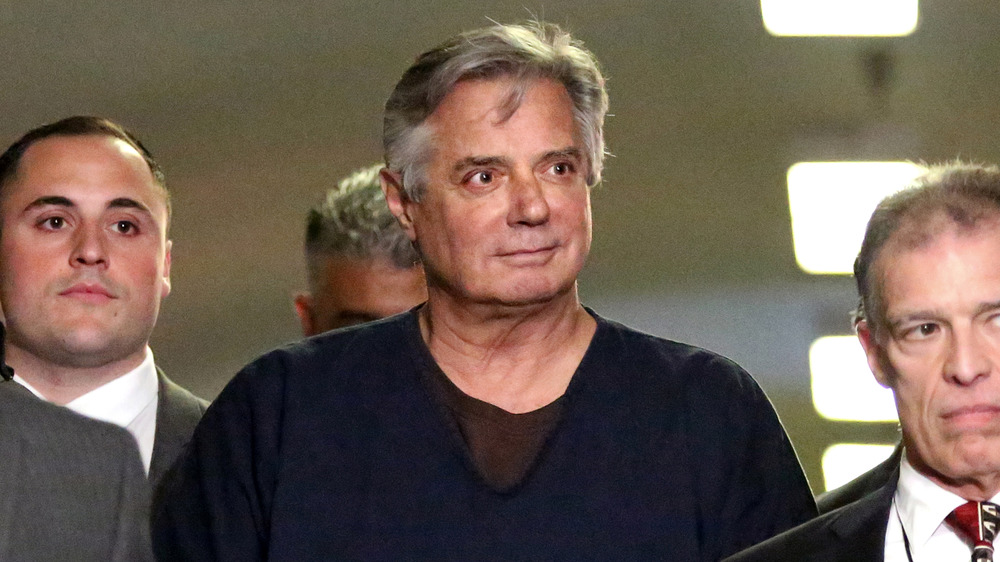The Many People Donald Trump Has Fired During His Presidency
Donald Trump is the king of catchphrases — from the ferocious chants of "lock her up" amidst the Hilary Clinton email scandal to the terse, repeated denials of "fake news." The latter serves as the ultimate irony as we watched the president's term seemingly end in a flurry of tweets flagged for inaccuracy with the image of Rudy Giuliani standing at a press conference podium in the parking lot of Four Seasons Total Landscaping.
Trump has certainly coined plenty of one-liners and nicknames during his four-year run (as we know, so-called "Sleepy" Joe Biden is likely already redesigning the same Blue Room curtains former FBI Director James Comey hid behind). Still, the most famous catchphrase remains a relic from his days on The Apprentice. "You're fired" has transcended television and basically defined Trump's administration, which has faced record turnover.
In four short years, Trump's White House has become a veritable revolving door. According to a study by Brookings, 91% of the president's top-level staff had turned over by November 2020. That's not to say they were all fired. A great deal of them resigned — whether it was in a spiral of political scandal, under duress, or because they simply had enough – but the President also had no problems hand-delivering the pink slips. From his campaign chair to his numerous national security advisors, here's a complete timeline of everyone Trump fired during his time as president.
Chris Krebs fought back against election misinformation
Following Joe Biden's projected presidential win, Donald Trump was fervently touting claims of voter fraud, so much so that he filed several election lawsuits in an attempt to stop key states from certifying their poll results. He even went as far as claiming — on numerous occasions — that he won the election anyway. This sentiment was not shared by the Department of Homeland Security, and more particularly, the Cybersecurity and Infrastructure Security Agency (CISA) led by director Chris Krebs, who took the post in 2018 and was fired after rallying against election misinformation.
In the days following the election, CISA released a statement with elections officials asserting that the 2020 election was "the most secure in American history." They also updated their website to include a "Rumor Control" section dedicated to dispelling election misinformation. This didn't sit well with Trump, who the BBC reports largely perpetuated these rumors in the first place.
Krebs left CISA, not with a bang, but with a tweet. Per the BBC, hours before he was fired, the senior election security official wrote, "On allegations that election systems were manipulated, 59 election security experts all agree, 'in every case of which we are aware, these claims either have been unsubstantiated or are technically incoherent.' #Protect2020." Trump announced Krebs' firing on Twitter, citing his "highly inaccurate" remarks about the election's integrity amidst alleged "massive improprieties and fraud." Twitter subsequently flagged Trump's tweet for potential fallacies.
Trump's alleged 'simple act of revenge' against Mark Esper
Defense Secretary Mark Esper, who took his post in 2019, was another casualty of Donald Trump's sheer unwillingness to accept election defeat. As The New Yorker put it, the president was in the midst of a "Pentagon Purge," firing the likes of top officials who clashed with his ideas.
According to the Boston Globe, Esper's firing — which was announced on Twitter in true Trump form — may have very well "been a simple act of revenge" that was brewing for months. The secretary disagreed with the president's threat to invoke the Insurrection Act, which would have deployed active-duty military on protesters in the wake of George Floyd's death.
Per the BBC, Esper was reportedly preparing to make his exit, whether it was by resignation or firing. Trump appears to have beaten him to the punch. He was replaced by Acting Secretary of Defense Christopher C. Miller, who was previously the director of the National Counterterrorism Center.
Gordon Sondland was caught snitching
Gordon Sondland, who served as US ambassador to the EU, appeared to be a reluctant supporter of Donald Trump even though the pair were cut from the same cloth. NBC News describes him as a "wealthy hotelier" that was "hand-picked" by the president after a massive donation. Though he originally backed a different candidate in 2016, according to the BBC, he ultimately donated $1 million to the president's inaugural committee. Nonetheless, everyone knows Trump does not appreciate snitches.
Sondland's fatal flaw appeared to be his testimony against Trump during the impeachment proceedings. The BBC reports that the hotelier-turned-diplomat "accused the president of seeking a 'quid pro quo' with Ukraine." You may recall Fox News commentators shouting "no quid pro quo" a lot around that time. In the aftermath, Trump was ultimately acquitted, and Sondland was out of a job. He was replaced by Ronald Gidwitz, who, at the time of this writing, also serves as US envoy to Belgium.
Lt. Col. Alexander Vindman, another casualty of Trump's impeachment case
Lt. Col. Alexander Vindman, who served as the leading Ukraine expert on the National Security Council, was another casualty of Donald Trump's impeachment case. According to the BBC, the former aide and "decorated Iraq war veteran" testified as a witness during the proceedings, where he revealed the details of the infamous phone call where Trump seemingly asked Ukrainian President Volodymyr Zelensky to investigate the Biden family.
Per Reuters, Vindman — who reported the phone call to a superior — claimed it was so shocking that he "couldn't believe what [he] was hearing." Trump, on the other hand, described the phone call as "perfect" and claimed Vindman was "insubordinate."
Vindman's lawyer told BBC that his client was specifically fired for his testimony. The veteran was reportedly "escorted from the White House" (along with his twin brother, who also served the National Security Council) and subject to a "campaign of bullying, intimidation and retaliation" by Trump. The Lieutenant Colonel has since retired from the military, claiming his future was "forever limited."
Did John Bolton resign, or was he fired?
In April 2018, John Bolton became Donald Trump's third national security advisor. Though his reign was short-lived, his downfall was notably less dramatic than that of Michael Flynn, who resigned from the gig in 2017 after admitting that he lied about conversations with the Russian ambassador to the United States. Yes, charges were filed (and ultimately dropped). By all accounts, Bolton's alleged forced resignation seemed like a matter of differing opinions, and the end result was a saucy memoir rather than possible jail time.
According to the BBC, Bolton regularly butted heads with Trump, particularly regarding peace talks with the Taliban. That appeared to be his downfall. In a tweet, the former reality star revealed that Bolton's services were "no longer needed" in the White House and that he "disagreed strongly with many of his suggestions." The pair then had a brief spat over who first ordered the resignation in true you-can't-fire-me-because-I-quit fashion.
Overall, it didn't seem like Bolton was willing to play Trump's game. A former senior official told the BBC that the former national security advisor "did not attend meetings" and rather "[ran] his own show" throughout his term. Following his exit, Bolton published his memoir The Room Where It Happened. According to The New York Times, the bombshell book urged for a possible impeachment investigation, but when the time came, Republicans reportedly "blocked" Bolton from testifying.
Lt. Gen. HR McMaster was too 'gruff' for Trump
In the wake of Michael Flynn's resignation, Lt. Gen. HR McMaster took on the role of national security advisor, where he regularly butted heads with Donald Trump. In fact, according to The New Yorker, the real estate mogul reportedly went as far as slamming the Lieutenant General for looking "like a beer salesman" in his suit when they first met in 2017.
According to the BBC, Trump didn't like McMaster's "gruff and condescending" manner, though he was widely known as a military intellectual. Still, where they really disagreed was foreign policy, particularly the administration's stance on Russia, North Korea, and Iran.
McMaster was ultimately fired in a tweet after 13 months. Today, his run in the Trump administration is a small blip in an otherwise storied career that garnered him a spot on Time's 2014 list of 100 most influential people. He's since released a memoir titled Battlegrounds: The Fight to Defend the Free World.
Rex Tillerson allegedly dubbed Trump a 'moron'
Rex Tillerson, a former oil executive, was Donald Trump's first secretary of state. Per the BBC, he was the one who "pushed" to end Russian sanctions and resume "peace talks with North Korea" (which means he's about two degrees away from Dennis Rodman). Nonetheless, Trump hit him with his famous "You're fired" — but why?
According to CNN, the former reality star claimed he "got along well with Rex," but that's totally ignoring the widely reported incident in which Tillerson allegedly called Trump a "moron" after he suggested a tenfold increase in the United States nuclear arsenal. According to The Washington Post, the former secretary of state didn't exactly deny it, but he didn't own up either. He did, however, tell CBS' Bob Schieffer that Trump was "pretty undisciplined" and "doesn't like to read." Read between the lines.
The BBC reports that Tillerson's alleged comments led Trump to challenge the secretary of state to "compare IQ tests," an offer he surprisingly didn't take. Like typical, Trump fired the former oil executive in a tweet, and Tillerson reportedly got no prior notice.
Steve Bannon's dismissal was a long time coming
Steve Bannon, the former executive chairman of right-wing media outlet Breitbart News, did not go quietly, but before his eventual firing, he was one of Donald Trump's most influential advisors. As chief strategist, the media mogul arguably helped embolden the president's fervently supportive base by touting various conspiracy theories like the existence of a deep state (which he's since rescinded, per The Guardian) and Pizzagate (a theory NBC News traced directly to his associates).
According to the BBC, Bannon's firing appeared to be sparked by Trump's response to the violent white nationalist and alt-right rally in Charlottesville, Va., where an anti-racist protester was killed in what appeared to be an intentional hit and run. Trump faced major backlash after claiming there were "very fine people on both sides." Nonetheless, Bannon's dismissal seemed like a long time coming. Some of Trump's most revered advisors had reportedly been pressuring Trump to fire him for months.
Following his exit, Bannon was interviewed for Michael Wolff's book Fire And Fury, where he claimed the infamous Trump Tower meeting between Donald Trump Jr. and a group of Russians was "treasonous" and "unpatriotic," per The Guardian. The president later retorted, "When he was fired, he not only lost his job, he lost his mind." At the time of this writing, Bannon is enjoying his time out of prison as he awaits trial over fraud charges stemming from his We Build the Wall campaign, according to The New York Times.
Anthony Scaramucci lasted a mere 10 days
Anthony Scaramucci, better known as the Mooch, was one of Donald Trump's shortest appointments. His brief tenure as White House communications director is so infamous that Vanity Fair published a list of the financier's best moments, which included habitually declaring his love for Donald Trump and Sean Spicer quitting the day he was hired (and subsequently appearing on Dancing With the Stars in a neon green blouse). Sadly, there aren't actually too many moments because Scaramucci lasted just 10 days.
According to reports from The New York Times and the BBC, Scaramucci's downfall was his brash and often bold behavior. In less than two weeks, the Wall Street bigwig told a New Yorker reporter that Chief of Staff Reince Priebus was a "paranoid schizophrenic" during an expletive-filled rant that also name-dropped Steve Bannon. Priebus exited the White House. Scaramucci's wife filed for divorce, he missed the birth of his son, and the day he got fired, he was erroneously declared dead in Harvard Law School's alumni directory. It was not a good week and a half for the Mooch.
Trump fired Scaramucci by proxy. The real deed was done by Gen Kelly on the day he was sworn in as chief of staff. According to The New York Times, Kelly promised to "impose military discipline on a free-for-all West Wing," and there's nothing more Wild West than running your mouth to the press.
Reince Priebus was 'kicked out of the presidential motorcade'
In a sea of newcomers, Chief of Staff Reince Priebus was the rare Washington vet, but according to the BBC, he struggled to have his voice heard over "competing powers" within the White House. It's hard to win out when your authority has the potential to be undermined by Donald Trump's children or the odd reality TV contestant.
Priebus dramatically made his exit shortly after Scaramucci's infamous rant to The New Yorker, in which he was accused of leaking damaging stories about the communications director amidst an alleged months-long feud. According to The New York Times, Trump was parked on a tarmac in Air Force One with Priebus when he announced the administrative change in a tweet. Priebus was swiftly whisked away in a car, or as Vox put it, literally "kicked out of the presidential motorcade."
At the time of this writing, reports differ on exactly what went down AF1. The New York Times claims he was "ousted," Politico reporter Josh Gerstein thought Trump may have fired him in-flight, and the BBC claimed he was "sacked" because Trump "lost confidence." Priebus, however, told Wall Street Journal reporter Michael C. Bender that he "resigned privately" a day prior — but then why was he shuttered away like a shamed celebrity in the midst of a public scandal? Someone needs to ring up the Mooch for a second opinion.
James Comey found out about his firing on the news
James Comey's firing wasn't exactly a shock. The former FBI Director was a key player in the Hillary Clinton email scandal, which on his part had less to do with ordering bunless hot dogs and more to do with timing. Per the BBC, a week before election day, he announced that the FBI was reopening an investigation into Clinton's private email server (and was subsequently met with outrage from Democrats). A week later, he announced that she'd face no charges (and was subsequently met with outrage from the "lock her up" camp).
According to CNN, Donald Trump claimed he fired Comey over the gaffe, but that may not have been entirely true. At the time, Comey was also leading the investigation into whether Trump's campaign colluded with Russia to interfere with the 2016 election. The Washington Post reports that, in sworn testimony, the former FBI director admitted he thought he was sacked to "change the way the Russia investigation was being conducted."
Comey found out about his firing on the news, but to be fair, the administration did hand-deliver a letter to his office. The former FBI director just happened to be visiting the west coast.
Sally Yates clashed with Trump regarding his travel ban
When it comes to shortest stays in the Trump administration, Sally Yates rivals the Mooch. The former deputy attorney general lasted just 10 days as acting attorney general before Donald Trump gave her the boot. So, what happened?
Yates was originally appointed by Barack Obama and clashed with Trump when he enacted his infamous executive order banning travel for citizens of seven Muslim-majority countries. According to The Washington Post, she believed it discriminated against Muslims — an unconstitutional offense — and "sent a memo to Justice Department employees" asking them not to enforce it.
Yates was fired shortly after, and the White House came out and admitted that it was largely to do with Trump's travel ban. "Ms. Yates is an Obama Administration appointee who is weak on borders and very weak on illegal immigration," they said in a statement. According to The Washington Post, she was notified with a hand-delivered letter before the news went public.
Preet Bharara refused to resign
Preet Bharara, Donald Trump's former New York federal prosecutor, was sacked amidst a widespread sweep of prosecutors, which isn't necessarily uncommon when the White House changes administrations. What's strange is the fact that Bharara refused to resign. Per Intelligencer, Trump originally told the attorney that he could stay on board, then called for his resignation along with that of 45 other Obama-appointed US attorneys. Bharara declined, and so he was fired.
According to the BBC, Bharara's jurisdiction included Trump Tower, and at the time of his exit, he was "overseeing several high-profile cases," including a larger investigation surrounding sexual harassment allegations at Fox News. As New York Magazine speculates, Bahara's firing may have had something to with the probe, especially because Bharara initially expected to stay and Trump saw Fox as a close ally.
Overall, Bharara served for seven years and seven months but lasted just two under the Trump administration.
Paul Manafort was indicted on a charge of witness tampering
Paul Manafort, the chair of Donald Trump's 2016 presidential campaign, was sacked after just three months on the job. He only spent five months with the campaign in total, yet proved to be a lasting presence due to the scandals that followed him on his way out.
According to the BBC, Trump's campaign never gave a reason for Manafort's firing, but there had been recent buzz alleging the campaign chair accepted "secret cash payments from a pro-Russian political party." After all, the rumor mill in the Trump admin is seemingly unending, but it only got worse when Manafort's infamous Trump Tower meeting became the center of the Russia investigation spearheaded by then-FBI Director Robert Mueller. According to AP, the chairman had "repeated contacts" with his longtime associate Konstantin Kilimnik, who "has ties to Russia's military agency."
Manafort was eventually cuffed during the Mueller probe and ended up landing prison time for the very rumors that likely got him ousted from Trump's campaign. According to The Washington Post, he faced bank and tax fraud charges and was subsequently indicted on a charge of witness tampering. Later, he "pleaded guilty to conspiracy to defraud the United States and obstruct justice" and was serving a seven-year sentence before he was released amidst the coronavirus pandemic.

